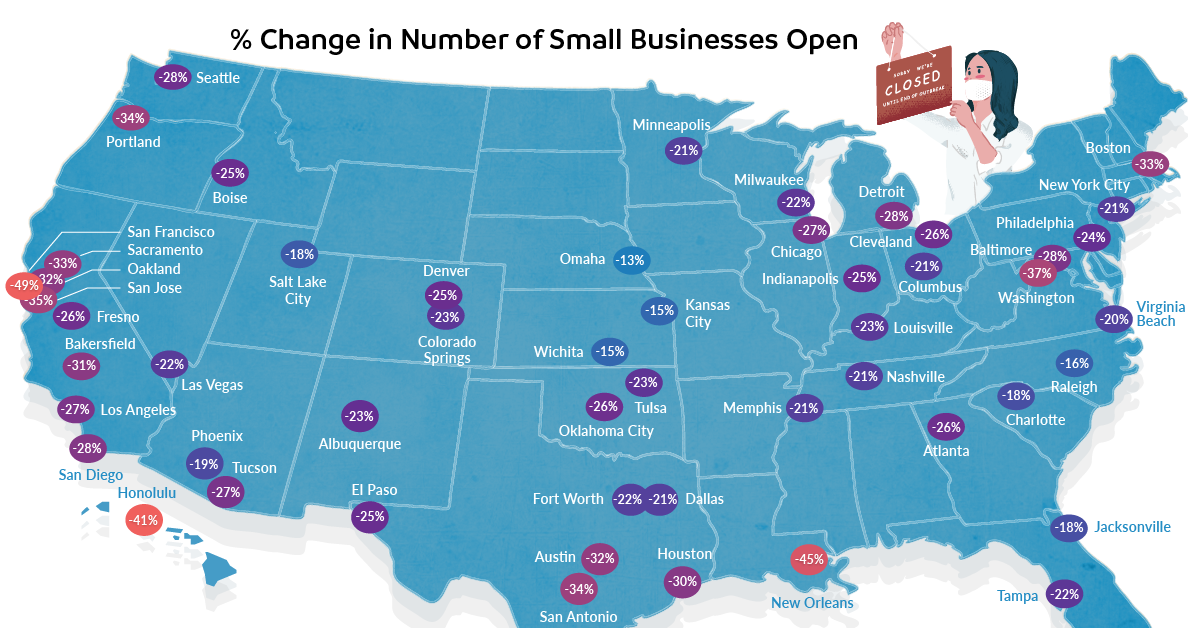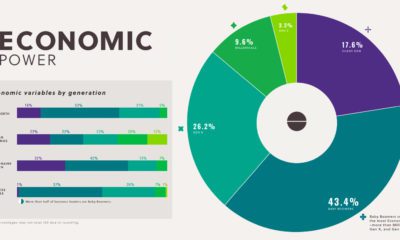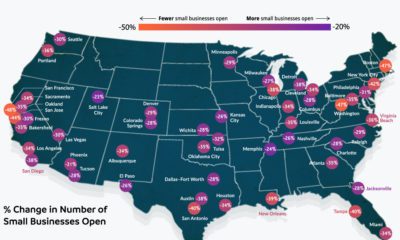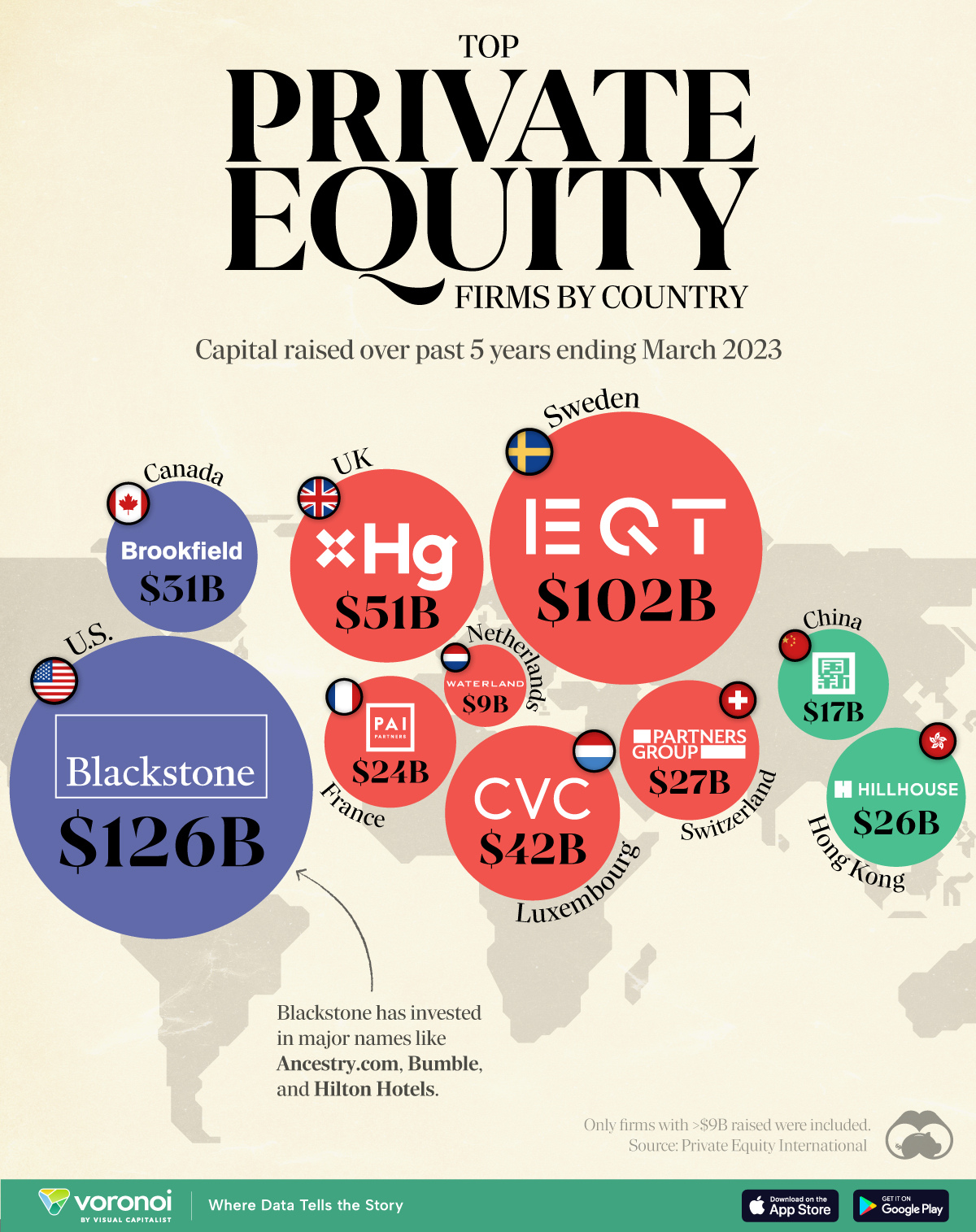Business
Mapped: The Uneven Recovery of U.S. Small Businesses
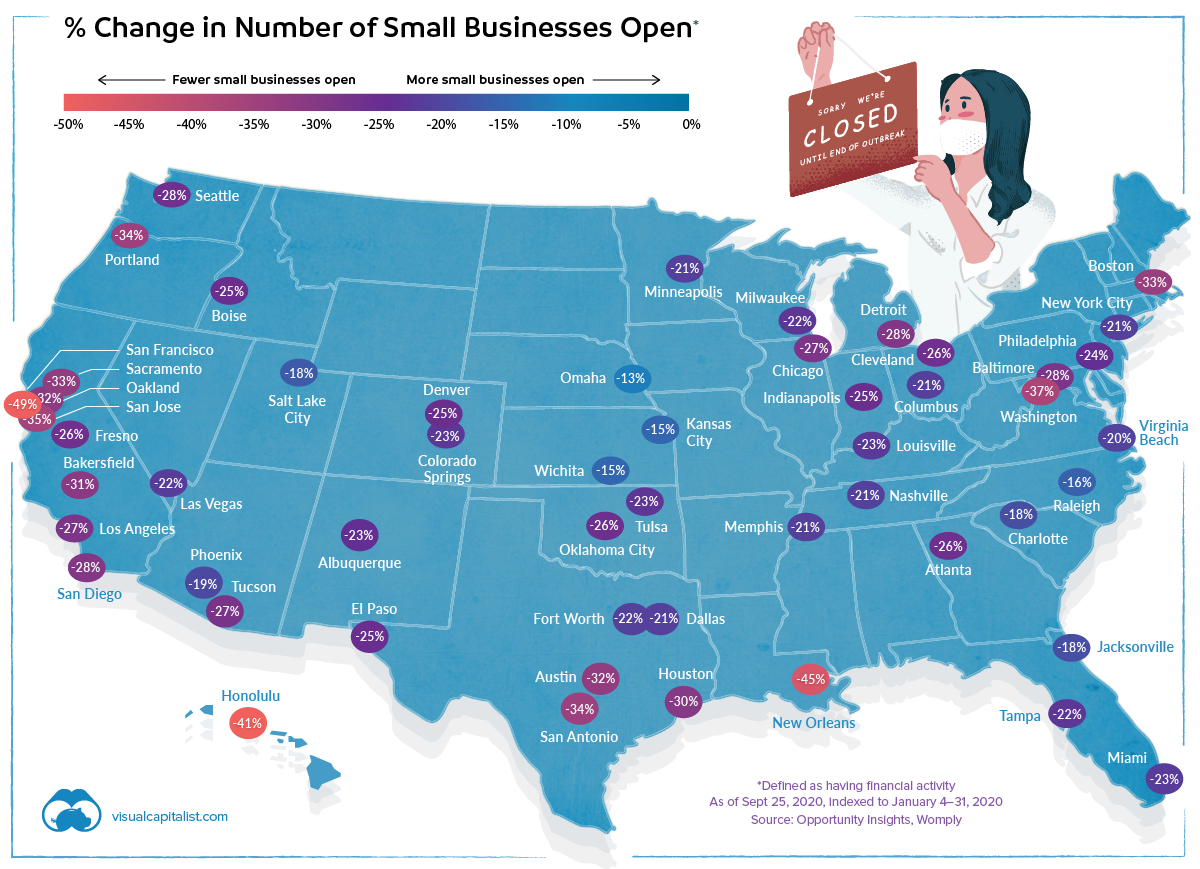
Mapped: The Uneven Recovery of U.S. Small Businesses
Small businesses are the backbone of the U.S. economy, employing nearly half of the private sector workforce.
Unfortunately, lockdown and work-from-home measures brought about by COVID-19 have disproportionately affected small businesses – particularly in the leisure and hospitality sectors.
As metro-level data from Opportunity Insights points out, geography makes a great deal of difference in the proportion of U.S. small businesses that have flipped their open sign. While some cities are mostly back to business as usual, others are in a situation where the majority of small businesses are still shuttered.
The Big Picture
In the U.S. as a whole, data suggests that nearly a quarter of all small businesses remain closed. Of course, the situation on the ground differs from place to place. Here’s how cities around the country are doing, sorted by percentage of small businesses closed as of September 2020:
| Metros | Small Businesses Closed | Small Businesses Closed (Leisure & Hosp.) |
|---|---|---|
| San Francisco | -49% | -65% |
| New Orleans | -45% | -72% |
| Honolulu | -41% | -39% |
| Washington DC | -37% | -55% |
| San Jose | -35% | -41% |
| Portland | -34% | -46% |
| San Antonio | -34% | -60% |
| Sacramento | -33% | -43% |
| Boston | -33% | -42% |
| Oakland | -32% | -52% |
| Austin | -32% | -65% |
| Bakersfield | -31% | -64% |
| Houston | -30% | -58% |
| Seattle | -28% | -47% |
| San Diego | -28% | -41% |
| Baltimore | -28% | -43% |
| Detroit | -28% | -44% |
| Los Angeles | -27% | -39% |
| Chicago | -27% | -37% |
| Tucson | -27% | -37% |
| Atlanta | -26% | -33% |
| Fresno | -26% | -50% |
| Oklahoma City | -26% | -56% |
| Cleveland | -26% | -39% |
| Denver | -26% | -56% |
| Indianapolis | -25% | -29% |
| Denver | -25% | -38% |
| El Paso | -25% | -34% |
| Philadelphia | -24% | -34% |
| Tulsa | -23% | -40% |
| Albuquerque | -23% | -42% |
| Colorado Springs | -23% | -37% |
| Louisville | -23% | -25% |
| Miami | -23% | -38% |
| Fort Worth | -22% | -34% |
| Las Vegas | -22% | -35% |
| Tampa | -22% | -45% |
| Milwaukee | -22% | -30% |
| New York City | -21% | -40% |
| Dallas | -21% | -38% |
| Memphis | -21% | -37% |
| Minneapolis | -21% | -36% |
| Nashville | -21% | -39% |
| Columbus | -21% | -35% |
| Phoenix | -19% | -36% |
| Jacksonville | -18% | -35% |
| Salt Lake City | -18% | -24% |
| Charlotte | -18% | -42% |
| Raleigh | -16% | -34% |
| Wichita | -15% | -29% |
| Kansas City | -15% | -24% |
| Omaha | -13% | -14% |
New Orleans and the Bay Area are still experiencing rates of small business closures that are almost double the national median.
Small businesses in the leisure and hospitality sector have been particularly hard hit, with 37% reporting no transaction data.
Getting Back to Business
Some cities are seeing rates of small business operation that are nearing pre-pandemic levels.
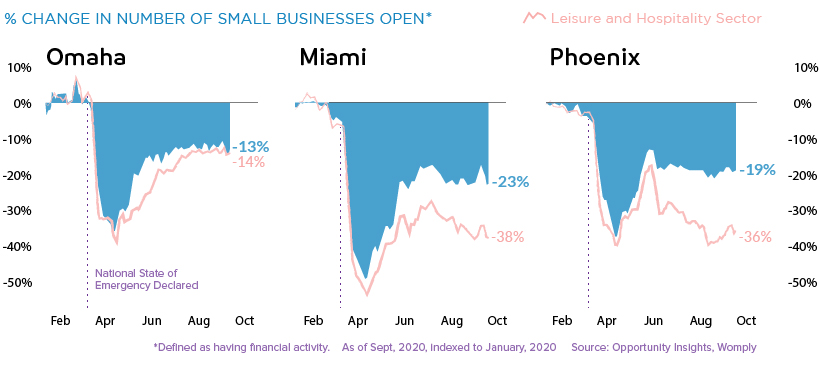
Of the cities covered in the data set, Omaha had the highest rate of small businesses open.
Still Shuttered
In cities with a large technology sector, such as San Francisco and Austin, COVID-19 is shaking up the economic patterns as entire companies switched to remote working almost overnight. This is bad news for the constellation of restaurants and services that cater to those workers.
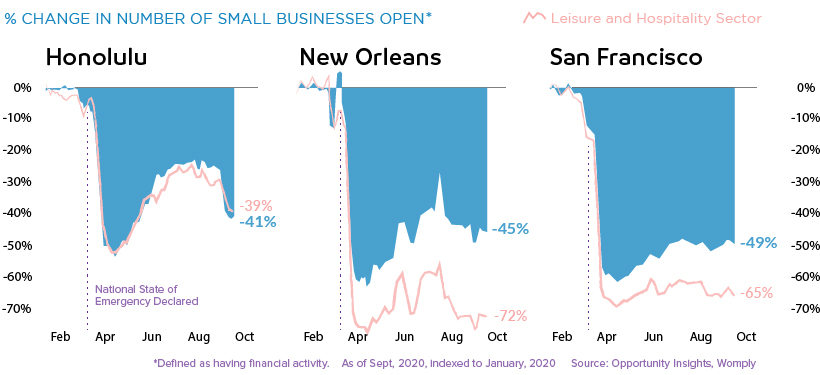
Likewise, cities that have an economy built around serving visitors – Honolulu and New Orleans, for example – have seen a very high rate of small business closures as vacations and conferences have been paused indefinitely.
As the pandemic drags on, many of these temporary closures are looking to be permanent. Yelp recently reported that of the restaurants marked as closed on their platform, 61% are shut down permanently. As well, businesses in the retail and nightlife categories also saw more than half of closures become permanent.
In Remembrance of Revenue
A business being completely closed is a definitive measure, but it doesn’t tell the whole story. Even for businesses that remained open, revenue is often far below pre-pandemic rates.
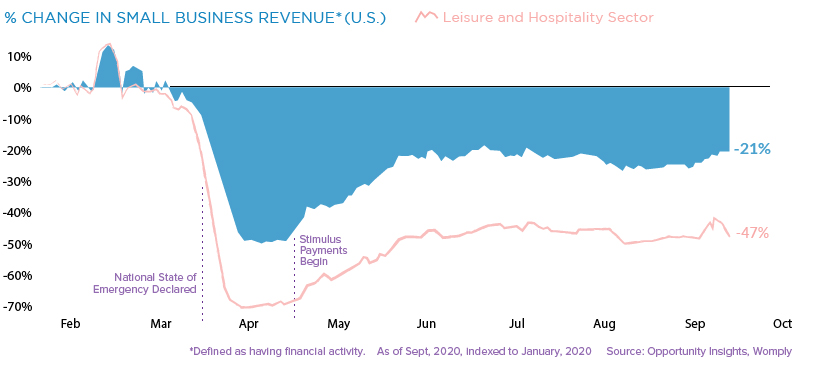
Once again, businesses in the leisure and hospitality sector have been hit the hardest, with revenue falling by almost half since the beginning of 2020.
At present, it’s hard to predict when, or even if, economic activity will completely recover. Though travel and some level of in-office work will eventually ramp back up, the small business landscape will continue to face major upheaval in the meantime.
Business
The Top Private Equity Firms by Country
This map visualizes the leading private equity firms of major countries, ranked by capital raised over the past five years.
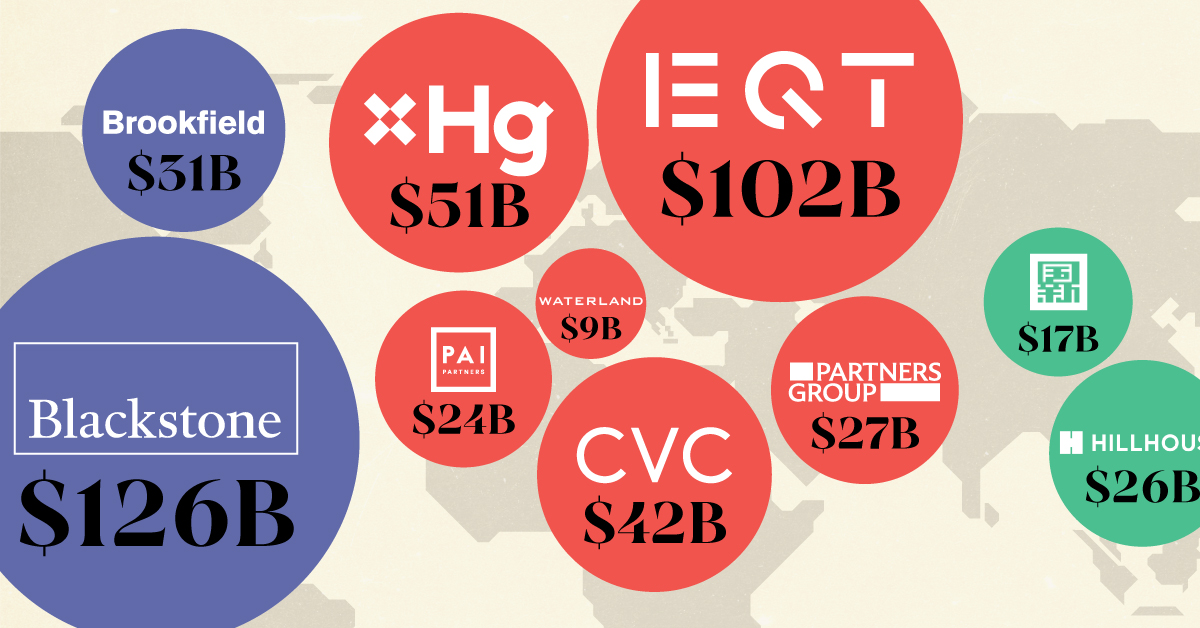
The Top Private Equity Firms by Country
This was originally posted on our Voronoi app. Download the app for free on iOS or Android and discover incredible data-driven charts from a variety of trusted sources.
Private equity firms are investment management companies that pool investor capital to acquire stakes in private companies. Through strategic management, they aim to enhance the value of these companies, then profit from a future sale or public offering.
To gain insight into this industry, we’ve visualized the top private equity firms in various countries, ranked by the amount of capital they raised over the past five years ending March 2023.
The cutoff for inclusion in this graphic was $9 billion raised. All figures come from Private Equity International’s PEI 300 ranking.
Data and Highlights
The data we used to create this graphic is included in the table below.
| Country | Firm | Amount raised |
|---|---|---|
| 🇺🇸 US | Blackstone | $126B |
| 🇸🇪 Sweden | EQT | $102B |
| 🇬🇧 UK | Hg | $51B |
| 🇱🇺 Luxembourg | CVC Capital Partners | $42B |
| 🇨🇦 Canada | Brookfield Asset Management | $31B |
| 🇨🇭 Switzerland | Partners Group | $27B |
| 🇭🇰 Hong Kong | Hillhouse Capital Group | $26B |
| 🇫🇷 France | PAI Partners | $24B |
| 🇨🇳 China | China Reform Fund Management Corp | $17B |
| 🇳🇱 Netherlands | Waterland Private Equity | $9B |
U.S.-based Blackstone is the world’s largest private equity firm, with operations in additional areas like credit, infrastructure, and insurance.
While not shown in this graphic, the U.S. largely dominates the private equity landscape. If we were to rank the top 10 private equity firms by the same metric (capital raised over past five years), U.S. firms would account for eight of them.
More About Blackstone
Blackstone was founded in 1985 by Peter G. Peterson and Stephen A. Schwarzman, both former Lehman Brothers employees.
Notably investments that Blackstone has made include Ancestry.com, where it acquired a majority stake for nearly $5 billion in 2020.
In 2007, it also acquired Hilton Worldwide (one of the world’s biggest hotel operators) for roughly $26 billion.
Sweden’s EQT
EQT is Sweden’s largest private equity firm, and third largest globally. It is just one of three firms that have raised over $100B in capital over the past five years alongside Blackstone and KKR (also American).
EQT made news earlier this year when it raised $24B in two years for its EQT X private equity fund, which invests in the healthcare, technology and tech-enabled service sectors.
If you found this post interesting, check out this graphic that visualizes the most common types of investments that financial advisors use with their clients.
-

 Technology6 days ago
Technology6 days agoAll of the Grants Given by the U.S. CHIPS Act
-

 Uranium2 weeks ago
Uranium2 weeks agoThe World’s Biggest Nuclear Energy Producers
-
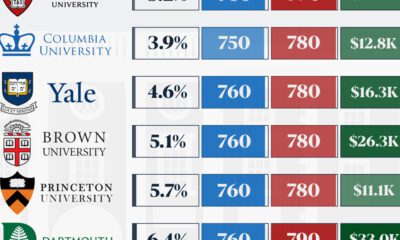
 Education2 weeks ago
Education2 weeks agoHow Hard Is It to Get Into an Ivy League School?
-
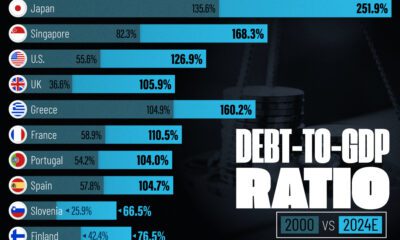
 Debt2 weeks ago
Debt2 weeks agoHow Debt-to-GDP Ratios Have Changed Since 2000
-

 Sports2 weeks ago
Sports2 weeks agoThe Highest Earning Athletes in Seven Professional Sports
-
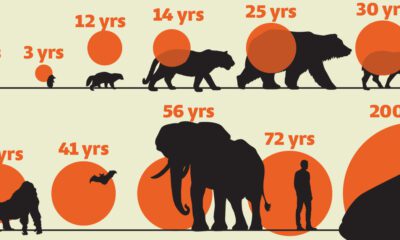
 Science2 weeks ago
Science2 weeks agoVisualizing the Average Lifespans of Mammals
-

 Brands1 week ago
Brands1 week agoHow Tech Logos Have Evolved Over Time
-

 Energy1 week ago
Energy1 week agoRanked: The Top 10 EV Battery Manufacturers in 2023

